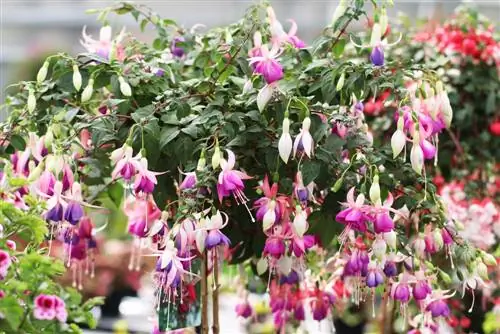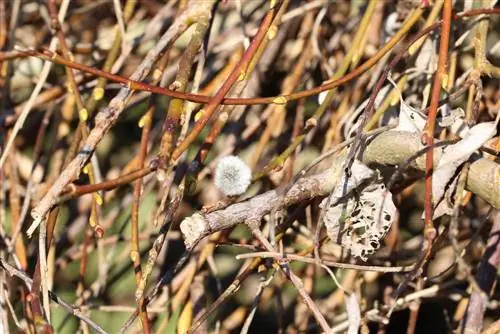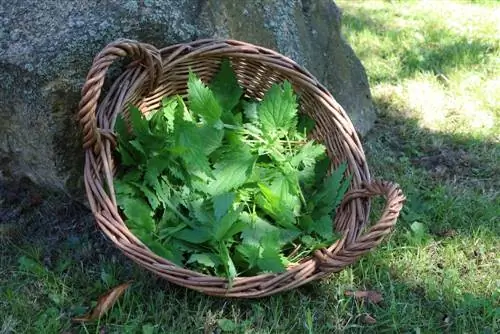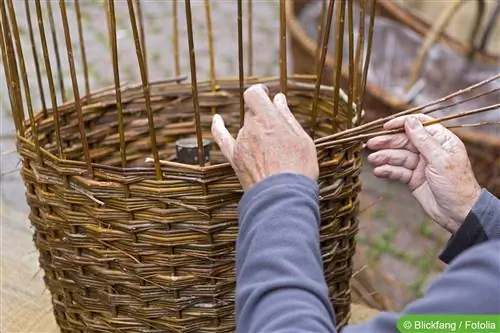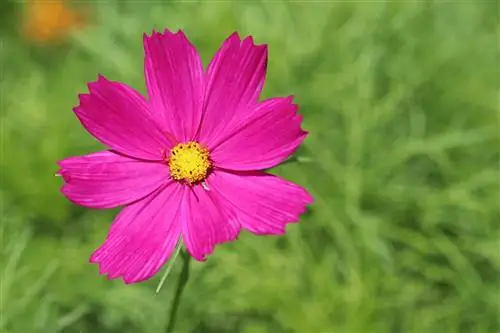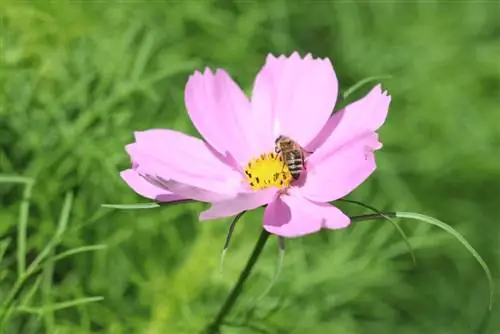- Author admin caroline@plants-knowledge.com.
- Public 2023-12-17 03:39.
- Last modified 2025-01-24 12:45.
Hanging baskets are flower containers of a slightly different kind. With their contents, they enhance dull house walls and decorate small balconies without taking up any of their limited space. Properly planted, they appear to consist only of flowers, while the pot disappears invisibly underneath. Would you like a large sea of flowers in your favorite color, or would you rather have a colorful mix?
Plants for sunlit hanging baskets
It is the sun that attracts the plants to produce their colorful flowers. Sunny locations are perfect for flowering hanging baskets. If you combine several plants together, make sure they have the same preferences so that they all thrive optimally later. Below is a selection of varieties as inspiration for the next planting.
Geranium (Pelargonium)
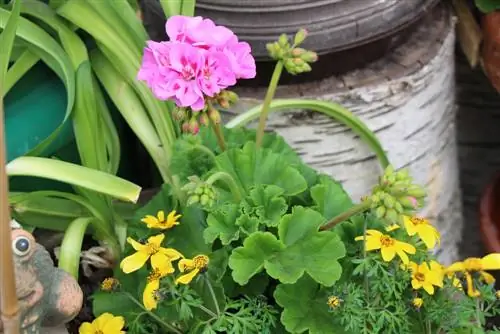
No, the geranium is not a true Bavarian! Even if no one here may believe it, this plant originally comes from South Africa. The most convincing way to show that we like it here is with its abundance of flowers.
- undemanding and resilient
- does not require a green thumb
- incredibly wide variety of varieties
- also two-color versions
Hussar Button (Sanvitalia procumbens)
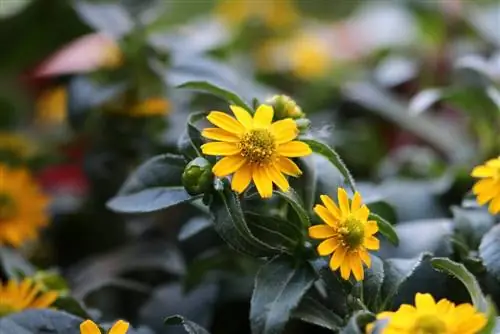
With its numerous small flowers, the hussar button transforms the hanging basket into a bright yellow ball. This pleasing sight lasts until autumn. If the ease of flowering decreases in between, a pruning is enough so that new flowers will soon sprout.
- is one of the easiest-care hanging plants
- can tolerate wind and rain
- Three plants are enough per hanging basket
Lobelia (Lobelia)
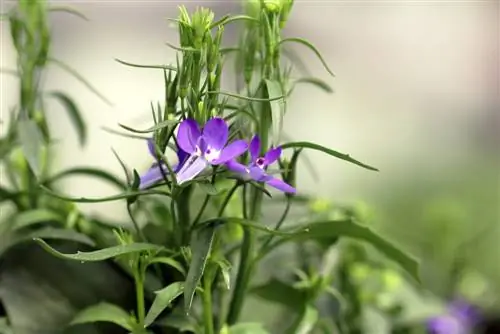
Due to the toxins it contains, lobelia is a plant that should only thrive away from small children. If you don't have to worry about that, you can look forward to a sea of flowers.
- also known as men's loy alty
- countless small blue flowers
- prefer hanging varieties for hanging baskets
- Pruning after the first flowering
- a rebloom follows as a reward
Petunia (Petunia)
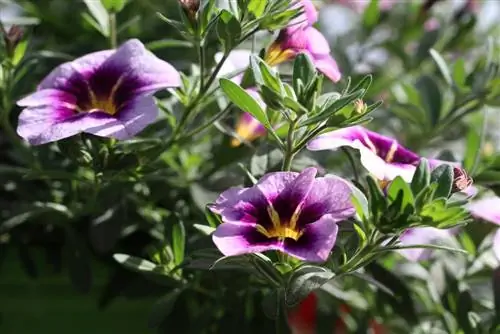
Her nickname could be the “tireless one” because the petunia never takes a break when blooming. Countless colorful balconies testify to their endurance. But the petunia also turns a hanging basket into a huge flower ball.
- cheap and available everywhere
- new varieties are constantly coming onto the market
- filled, patterned and colorful
- can also cope with blazing sun
- requires increased maintenance effort
Tip:
As beautiful as petunias are, they are unfortunately also susceptible to diseases and pests. Therefore, make sure you have good vitality when purchasing.
Snowflake flower (Chaenostoma cordatum)
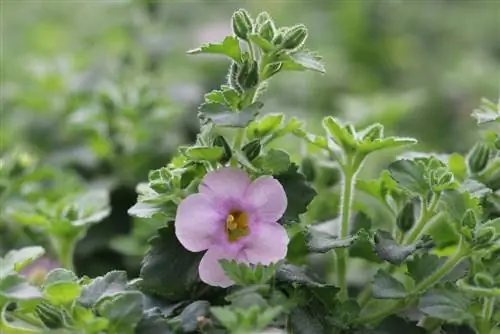
The snowflake flower owes its name to the color white in which it paints its small flowers. Varieties of different colors are rather rare. Although the color white harmonizes well with other plants, a fully bloomed snowflake flower can also shine alone in a hanging basket.
- is not sensitive to weather
- particularly easy to care for
- we are becoming more and more popular
- the market regularly offers new varieties
- for example with larger flowers
Magic Bells (Calibrachoa)
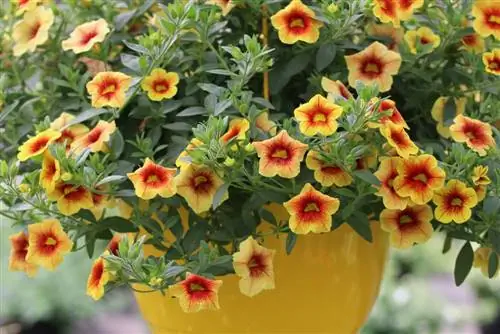
It is also called mini petunia because of its appearance, but its bell-shaped flowers are smaller. This annual plant is ideal as a border planting in a hanging basket, as the tendrils can hang down up to 50 cm long.
- has a wide range of colors
- grows beautifully compact
- some varieties tolerate rain and wind
- Can be decoratively combined with other plants
Blue Mauritius (Convolvulus sabatius)
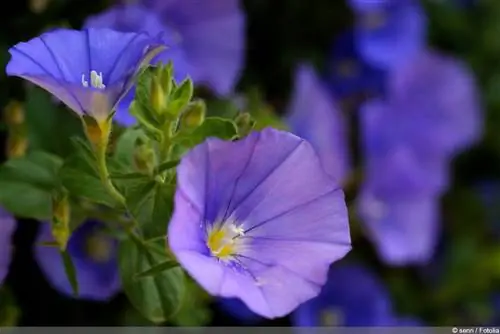
Nobody has to fear these winds. On the contrary, their rapid growth is welcome in a hanging basket. Its long tendrils are covered with simple sky blue flowers.
- needs a lot of nutrients and water
- is happy about adding lime
- Cleaning out faded and dried things
- overwinter cool and bright until next season
Pear melon (Solanum muricatum)
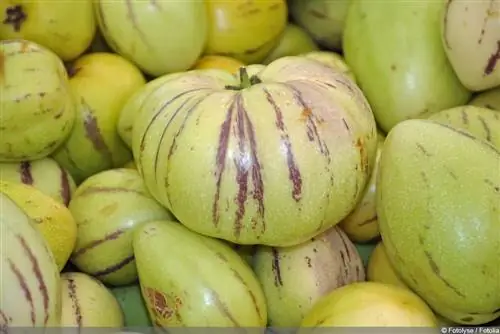
It is a plant that is rarely found in pots in this country. The plant, which comes from South America, is also called Pepino. The flower color varies between white and deep blue depending on the temperature. But the most striking thing about Pepino are the fruits, which are a mixture of melon and pear.
- place protected from rain and sunny
- provide well with water
- only annual in this country
- also perennial in the greenhouse
Plants for a partially shaded location
If the blazing sun is too harsh on the leaves of some plants, it is time to flee to partial shade. There is still enough light there so that no flowers have to suffer.
Blue Fan Flower (Scaevola aemula)
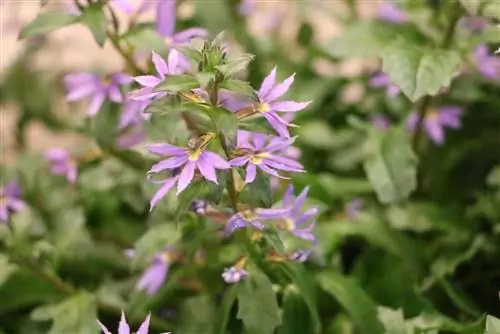
The blue fan flower tolerates sun, but also thrives wonderfully in partial shade. It is perennial and also very robust. It fills any container quickly without requiring much care.
- the root ball can tolerate short-term drought
- drops dried flowers on its own
- constantly sprouting new buds
Hanging Snapdragon (Antirrhinum)
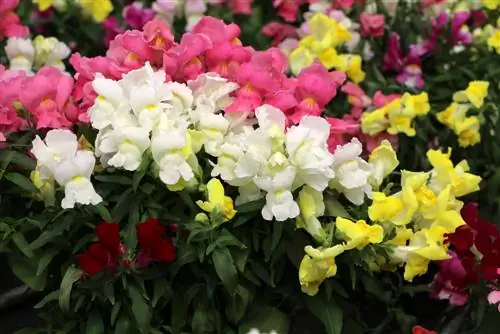
Hanging snapdragon is very easy to grow from seeds, grows quickly and blooms until the first frost. The annual cultivated plant can even survive in a mild winter and give us a second year of flowering.
- blooms in different colors
- Short shoots for bushy appearance
- Removing faded flowers
Tip:
This plant uses few nutrients and would even thrive without fertilizer, although it will bloom more modestly. If you fertilize it, you should know that it does not like lime-based fertilizers.
Split Flower (Schizanthus)
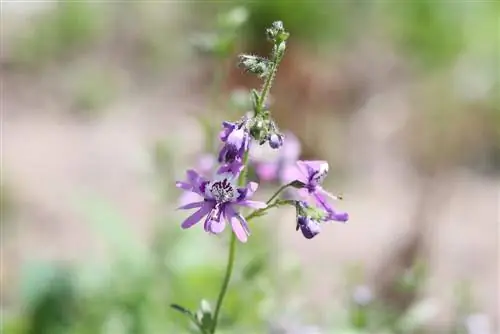
It is also popularly called the farmer's orchid, but despite the flower resemblance it is not related to orchids. The plant, which comes from South America, tolerates extreme heat and cold.
- Blossoms last a very long time
- bright colors
- annual, but can be easily propagated from seeds
- do not plant too densely, must be able to dry out after rain
- if applicable hang up protected from rain
Starflower (Ipheion)
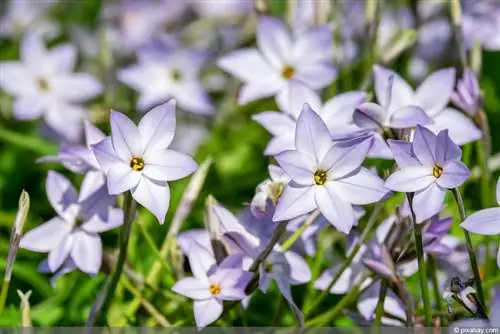
The star flower, as you can easily guess from the name, enchants with its star-shaped flowers. Although they are extremely small, their number is uncountable.
- plant the onions from April
- fertilize regularly until July
- Overwinter tubers in the cellar
Plants for shady hanging baskets
Everyone knows places where there is simply no sun. But they don't have to remain unused or go without floral decorations. There are actually some varieties that have the potential to transform a hanging basket into a great sight even in such a place.
Begonias (Begonia)
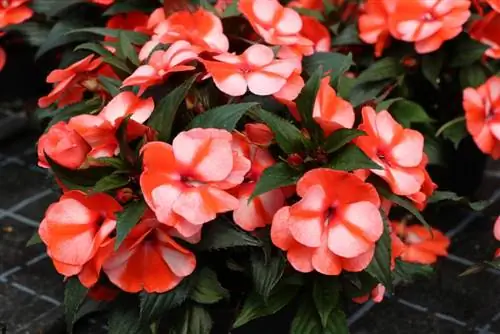
Hanging varieties are ideal for a hanging basket that is only assigned a shady location. With a regular supply of nutrients, they diligently develop their flowers and in a wide variety of colors.
- simple and double flowers
- for bushy growth, prune young shoots
- Bulbs can be overwintered
Ivy (Hedera helix)
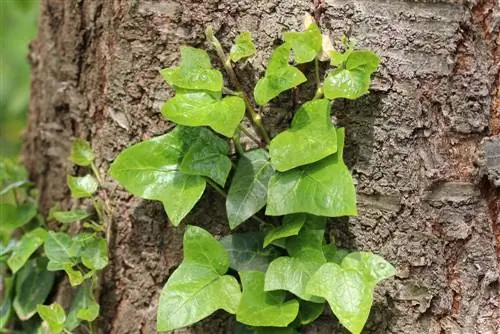
As a solitary plant, the fast-growing ivy can fill the hanging basket with its countless green leaves. But in combination with a flowering plant it is much more attractive.
- evergreen plant
- forms long tendrils
- also available with a beautiful pattern
- unfortunately it is poisonous
- hang away from small children and pets
Hardworking Lieschen (Impatiens walleriana)
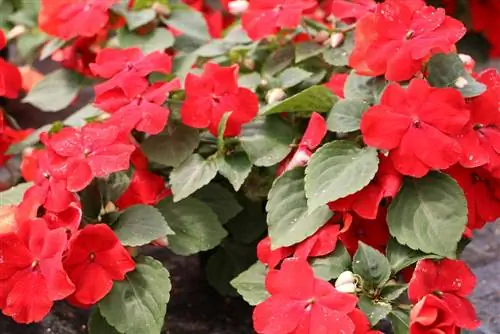
If you plant Busy Lieschen in a hanging basket at the beginning of the outdoor season, you have provisions for many months to come. It gets to work hard in spring and accompanies us with its numerous flowers right into autumn.
- does not like extreme heat and dryness
- you need to water constantly in summer
- fertilize every two weeks
- Promote bud formation, so remove dead flowers
- Buy young plants every year, overwintering is not worth it
Fuchsia (Fuchsia)
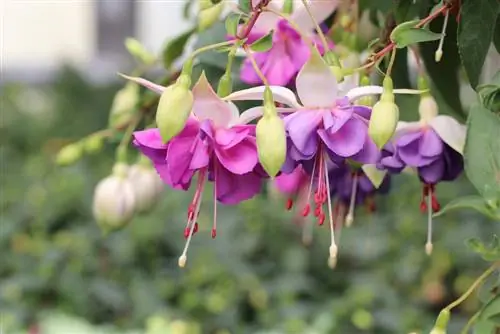
Hanging varieties are ideal for hanging baskets when only a shady spot is available. With a fuchsia, the hanging basket can bloom in your favorite color, because this type of flower offers an incredible amount of choice.
- don't be stingy with your flowers
- blooms from April to October
- don't like drought, water a lot
- fertilize weekly
- or provide with slow-release fertilizer
- Be sure to remove the tips for stronger growth
Tip:
Fuchsias can survive the winter undamaged in a cool and bright room and can be hung again in their place from May.
Frankincense (Boswellia)
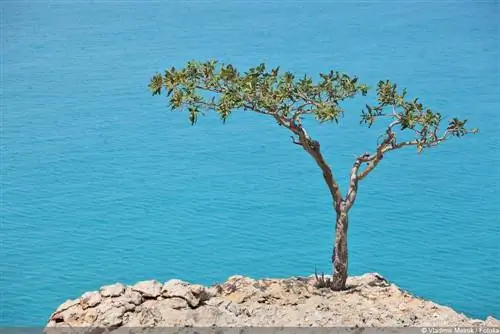
This plant smells lightly of incense and is said to repel mosquitoes. Its green and white patterned leaves are so decorative that the plant alone can make the hanging basket an eye-catcher.
- Leaves have ornamental value
- Flowers are rather inconspicuous
- Plant can be overwintered
Plant closed hanging baskets correctly
Closed pots for hanging baskets are made from different materials. The most common are plastic, ceramic, clay and also metal. A hanging basket can be planted with a single type of flower, but large pots also offer enough space for several types of plants. The combination must always be coordinated so that your needs can be reconciled.
- Planting usually takes place from mid-May
- Lighting conditions at the location are crucial for the choice of variety
- are planted starting from the middle
- Plants growing upwards come to the middle
- climbing plants are in good hands at the edge
- a drainage layer prevents waterlogging
Planting open hanging baskets
Open hanging baskets are usually made from rattan or macrame. The woven baskets are permeable in their original state and are therefore not entirely suitable for planting. When planting an open hanging basket, proceed as follows:
- Line the hanging basket with some pine branches or burlap. This prevents soil from trickling out.
- So that the irrigation water does not immediately flow out of the traffic light, you should line the floor with a waterproof film.
- Prick a few holes in the foil to prevent waterlogging.
- Start planting laterally, inserting the roots of hanging plant varieties through gaps in the hanging basket.
- Then fill the hanging basket with substrate so that all roots are covered with it.
- Now the container is planted from above. The higher growing species are placed in the middle, followed by the slightly climbing varieties at the edge.
- Apply substrate to the gaps and press it lightly.
- Water the newly planted plants thoroughly and hang the hanging basket in the designated place.

